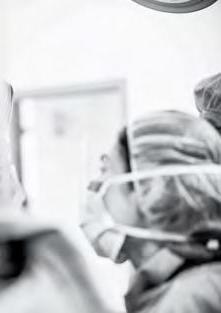
7 minute read
Role of near peer teaching
The changing landscape of surgical education - the role of near-peer teaching
Should more be done to educate and support medical students as they undertake new roles?
Advertisement
There is an axiom within surgery – see one, do one, teach one. This apprenticeship model has existed since the beginning, and to its credit has trained pioneering surgeons who have pushed the limits of medicine to new heights. However, over time, medical curriculums have expanded to include professional development, ‘soft’ skills, research, ethics, and practical skills. As a result, there is limited exposure during medical school to surgical subspecialties. Even when students are lucky enough to undertake clinical rotations on subspecialty terms, there is more seeing, less doing, and hardly any time for teaching. Every year more than 3,500 medical students graduate in Australia and come January more than 1,000 new interns enter the hospital system in NSW alone. The transition from medical student to junior doctor has long been considered a significant—albeit a stressful rite of passage. My first week of internship went past in a blur of bewilderment, anxiety, and a constant feeling of inadequacy. As the months progressed, I attempted to navigate this steep learning curve, trying to lessen the discrepancy between my capabilities and the expectations of hospital staff and patients. It was this experience that prompted me to question if more could be done to educate and support medical students as they undertake their new roles.
I am currently a General Surgery SET Trainee, balancing my learning with the teaching of those junior to me. My passion for teaching arose during medical school and has culminated in the organisation of numerous state and national medical conferences. Attendance was open to anyone interested and topics ranged from trauma, surgical skills, and leadership to global health. While lectures from keynote speakers and consultants were always a drawcard, the backbone of these conferences was undoubtedly the junior doctors. Recognising the benefits of near-peer teaching for both students and teachers, they volunteered their valuable weekends to facilitate small session tutorials and practical workshops. With limited available time in medical curriculums and formal teaching programs, I believe that educational courses and conferences play a valuable part in training and should be widely available to all students and junior doctors. The research I presented at the RACS ASC 2021 was conducted as part of my Master of Surgery thesis. The feedback I received from both attendees and volunteers during my earlier conferences served as the basis for my project, which examined the benefits of a near-peer teaching program in acute surgery. The participants for this research were penultimate year medical students, who participated in a pilot one-day teaching program. The program consisted of a small group didactic teaching and interactive practical sessions led by junior doctor volunteers. While the content was reviewed by the university faculty , the facilitators were given a free rein on how they wished to run their sessions. The surgical topics were chosen based on the final year curriculum and in consultation with a small focus group of interns and residents.
When analysing the results, I was not only interested in the outcomes of the teaching program, but also the reasons for attendance, their subspecialty exposure, and views on surgery as a specialty. None of the students reported having undertaken a prior ENT clinical placement. Also, despite being held towards the end of the term and near exams, the most frequently reported reasons for attendance were to increase knowledge, improve practical skills, and prepare for internship. Before attending the program, students rated their confidence levels as low globally. Improvements in scores for knowledge-based assessments were noted in all three topics, and selfreported confidence scores increased by 100 per cent. All the participants found the teaching program was relevant to internship and recommended its inclusion in their curriculum. Students found the near-peer teachers to be knowledgeable on the topics taught, highlighting the usefulness of feedback received. There is now greater awareness of the impact of preparedness on patient outcomes and junior doctor mental health. Like myself, many interns find their first few months of work stressful, with high personal expectations and concern about their competency in emergencies as commonly reported reasons. Universities have introduced pre-internship rotations to help students negotiate the transition to being junior doctors. Our research findings provide further evidence that a near-peer education program designed and conducted by junior doctors is an efficient, costeffective way of improving the knowledge and confidence levels of senior medical students in acute surgery. The benefits of near-peer teaching, simulation and repetitive practice within medicine are well known. While COVID-19 has changed the landscape of how we come together to share knowledge and ideas, the virtues of lifelong learning remain the same. I hope that this teaching program—and others like it—will improve intern readiness and patient safety by giving interns the tools they need to manage acute surgical emergencies before their first day.
Dr Wendy Liu, Winner of the Surgical Education Research Prize Article
Professional development 2022
Selected 2022 Professional Development courses are now open for registration. For more information on courses and to register, visit surgeons.org/ lifelong-learning For any queries, please email the Professional Development department at PDactivities@surgeons.org
Overwhelming support for respectful behaviour
A five-year evaluation finds 99 per cent of RACS Fellows, Trainees and SIMGs support respect in surgery
According to the findings of a fiveyear evaluation, the RACS community overwhelmingly supports the College’s work to build respect in surgery. Almost all Fellows, Trainees and SIMGs (99 per cent) believe they need to demonstrate respectful behaviours, and 96 per cent recognise the need to address unacceptable behaviour in colleagues and peers. The evaluation examined perceptions of RACS implementation of its Action Plan: Building respect, improving patient safety. More than 90 per cent support RACS work, leadership, and commitment to working in partnership to improve the culture of surgery. The evaluation looked at ‘expected’ changes in awareness, knowledge, skills and attitudes to discrimination, bullying and sexual harassment. Some data was collected on behaviour change ‘to inform further planning and to create a baseline for future evaluations’. The evaluation found that RACS has strong credibility among external stakeholders and college members for its commitment and leadership. Fellows, Trainees and SIMGs also backed the ongoing relevance of this work, as well as its focus on improving surgical education and fostering cross-sector collaborations to build respect in surgery. RACS commitment to building diversity was widely supported, along with an ongoing focus on improving surgical education. Issues around supervision remain challenging—supervisors reported feeling unsupported and fearful of legal challenges, and Trainees reported concerns about lack of transparent and actionable feedback. The report identifies the devolved structure of surgical training delivery as a barrier to implementing profession-wide initiatives to improve training and support cultural change. It found that ‘behaviour, a long-term goal of the Action Plan, is already beginning to change towards the desired outcomes. As expected, there is a gap between knowledge and behaviour, with variations in people’s level of confidence to take action when witnessing or experiencing an incident.’ The 2021 evaluation results will inform RACS next five years work to build a culture of respect in surgery. A separate prevalence study—also conducted in mid-2021—looked at reported rates of unprofessional behaviours. The results of the 2015 and 2021 prevalence studies are not directly comparable. The 2015 study detailed participants’ total experience of discrimination, bullying and sexual harassment over their working lifetimes. The 2021 study tracked reports of these kinds of unprofessional behaviour in the last 12 months. The nature of unprofessional behaviour reported in 2021 has changed. There are fewer reports of yelling, shouting, aggression, or physical abuse and more on belittling behaviour, career constraints, humiliating comments, or being undermined. The nature of reported sexual harassment is more nuanced in 2021, with fewer reports of sexual propositioning and inappropriate physical contact. There is an increase in reports of sexually explicit or offensive jokes and comments about appearance or sexual orientation. There is more reporting of sexual harassment by men and Trainees. There is support for RACS to focus on increasing diversity in the profession and an opportunity for the College to communicate its revised approach to complaints management more widely. Knowledge of respectful behaviours is widespread, and attitudes are changing, but ‘calling it out’ remains challenging and behaviour change is a long-term goal. RACS President, Dr Sally Langley, said wider community attitudes over the same period have shifted as a result of #metoo and vigorous public dialogue in Australia in 2021. “We are proud of the work we have done to build respect in surgery and just as importantly, that the overwhelming majority of surgeons support our focus and commitment,” Dr Langley said. “We know that cultural change takes time and is a shared goal across the health sector. This evaluation tells us we are on track, that RACS leadership is valued. It shows that we need to stay on course in our work to build a safe and respectful culture in surgery. This is good for our patients, our teams, and ourselves,” she added.
Building Respect Progress Report 2020
Building Respect, Improving Patient Safety
2020 Progress Report
1











